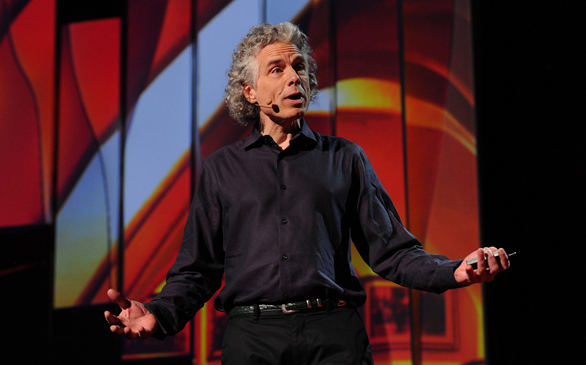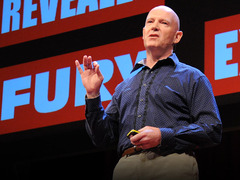
Steven Pinker is one of several TED speakers who’s given a talk about the art of verbal language. Photo: James Duncan Davidson
TED Talks cover an incredible breadth of topics — from mathematical origami to self-repairing architecture to personalized medicine. Some talks explore what lies at the very essence of TED — the act of talking. The 10 talks below explore the various dynamics of speech — from phonology to cognition to the socio-cultural role of language in society. These talks at times offer insight into the struggle for self-expression and at other times engage in contentious linguistic debates. As a whole, they provide a holistic and layered view of speech and language. Because what would TED be without talking?
 Roger Ebert: Remaking my voice
Roger Ebert: Remaking my voice
Roger Ebert: Remaking my voice
Roger Ebert: Remaking my voiceWe deeply miss Roger Ebert. In this poignant talk from TED2011, he shared his remarkable rediscovery of self-expression after losing his voice in the fight against jaw cancer. While he couldn’t speak for the last few years of his life, he explained how he found a captive audience on Twitter and through his blog. The talk, presented by Ebert, along with his wife and two friends, offers an inspirational glimpse into the life of someone who overcame incredible adversity. |
 Julian Treasure: 5 ways to listen better
Julian Treasure: 5 ways to listen better
Julian Treasure: 5 ways to listen better
Julian Treasure: 5 ways to listen betterA speaker is nothing without a listener, but as it stands, we retain only a quarter of what we hear. In this talk from TEDGlobal 2011, Julian Treasure offers five tips to better navigate our cacophonous soundscape and savor the noise around us. Following Treasures’s advice, we’ll become better communicators and will live in a better world. As he says, “A conscious listening world is a world of connection, of understanding and of peace.” |
 Terry Moore: Why is 'x' the unknown?
Terry Moore: Why is ‘x’ the unknown?
Terry Moore: Why is 'x' the unknown?
Terry Moore: Why is ‘x’ the unknown?Basing his argument on our physical capacity to produce sounds, Terry Moore provides a phonetic explanation for a question we’ve all asked ourselves. This is a short and sweet talk from TED2012. |
 Mark Pagel: How language transformed humanity
Mark Pagel: How language transformed humanity
Mark Pagel: How language transformed humanity
Mark Pagel: How language transformed humanity“Our destiny is to be one world with one language,” argues biologist Mark Pagel in this talk from TEDGlobal 2011. Outlining the social function of language evolution, he highlights the importance of language in fostering cooperation in a globalizing world. In the end, it’s worth making “all this fuss about a puff of air emanating from our mouth.” |
 Wade Davis: Dreams from endangered cultures
Wade Davis: Dreams from endangered cultures
Wade Davis: Dreams from endangered cultures
Wade Davis: Dreams from endangered culturesA fascinating speaker, with the opposite perspective. In this talk from TED2003, National Geographic Explorer Wade Davis emphasizes the importance of a diversity of languages and cultures in our world. What the world needs is not one universal language, but rather a respect for the unique values and worldview tied up in each linguistic system. Language loss is happening at an alarmingly rapid rate: 50% of the world’s languages are facing extinction — about one language dies every two weeks. “Language is a flash of the human spirit,” argues Davis. |
 Patricia Ryan: Don't insist on English!
Patricia Ryan: Don’t insist on English!
Patricia Ryan: Don't insist on English!
Patricia Ryan: Don’t insist on English!In this talk from TEDxDubai, Patricia Ryan – who has lived in the Gulf region for 30 years — argues for a multilingual education system. She asks: What if Einstein had to pass the TOEFL? We equate English with intelligence, but some of the world’s best thinkers may not be English speakers. In different linguistic systems, we’re able to conceive of different concepts. Until we encourage multilingualism, we can never know what we know. |
 Steven Pinker: What our language habits reveal
Steven Pinker: What our language habits reveal
Steven Pinker: What our language habits reveal
Steven Pinker: What our language habits revealLinguist Steven Pinker argues that language is a window into what makes humans tick in this compelling talk from TEDGlobal 2005. From metaphors to bribes to threats, indirect language speaks volumes about the inner workings of individuals and the societies we live in. By understanding the “cognitive machinery to conceptualize the world,” we will better understand ourselves. |
 James Geary: Metaphorically speaking
James Geary, metaphorically speaking
James Geary: Metaphorically speaking
James Geary, metaphorically speakingMetaphors give us Shakespeare, scientific discoveries and an understanding of financial crises. Metaphors are central to how we see the world, allowing us to understand complex or foreign concepts by putting them into a familiar context. Fun fact: we speak on average six metaphors per minute! In this cleverly worded talk from TEDGlobal 2009, James Geary explores the powerful force of the deeply influential word constructs that shape our reality. |
 Melissa Marshall: Talk nerdy to me
Melissa Marshall: Talk nerdy to me
Melissa Marshall: Talk nerdy to me
Melissa Marshall: Talk nerdy to meGreat communication from scientists and engineers will change the world, says professor Melissa Marshall in her talk from TEDGlobal 2012. Left-brain thinkers don’t need to dumb it down to make their ideas accessible to people without a technical bent, she argues. In this funny talk, Marshall provides a mathematical formula for perfect scientific communication. |
Comments (9)
Pingback: Ryzen Pharmaceuticals - Bodybuilding Blog
Pingback: Steroids USA - roids.blog
Pingback: TED’s list of 10 Great Talks to Inspire Your Talking – TEDxAungierSt
Pingback: US Steroids for Sale
Pingback: Como o TED me fez plantar árvores | É tipo Internet?